NCERT Solutions for Class 5 EVS Chapter 18 - No Place for Us
| Table of contents |

|
| Think and Tell |

|
| Tell |

|
| Discuss and Tell |

|
| Imagine |

|
| Write |

|
| Think |

|
| Find Out and Write |

|
| What we have Learnt |

|
Think and Tell
1. Jatrya felt alone, even in a crowd of people. Have you ever felt like this?
Ans. Yes, once I got separated from my mother in a market for a few minutes. Though there was a huge crowd of people still I was feeling all alone as I knew no one.
2. Imagine how it feels to leave one’s own place and go away to live in a new place?
Ans. It is very difficult to leave one’s own place and live far away in a new place. This is because, there is nobody with whom we can share our feelings, problems, and other matters. Thus, it feels very bad and sad to leave our own place.
3. Why do you think families like that of Jatrya’s are coming to big cities?
Ans. The families like that of Jatriya often come to big cities due to poverty, to earn more money and live a better life. There may also be many problems with them in the village. For example, sometimes due to scant rainfall, there is not much profit from the farms, sometimes they are asked to leave their villages by the government or private companies because of the construction of factories or dams, etc. Thus, they are forced to come to big cities.
4. Have you seen any children (in your school or neighborhood) who also go to work?
Ans. Yes, I have seen a few children in my neighborhood who go to work.
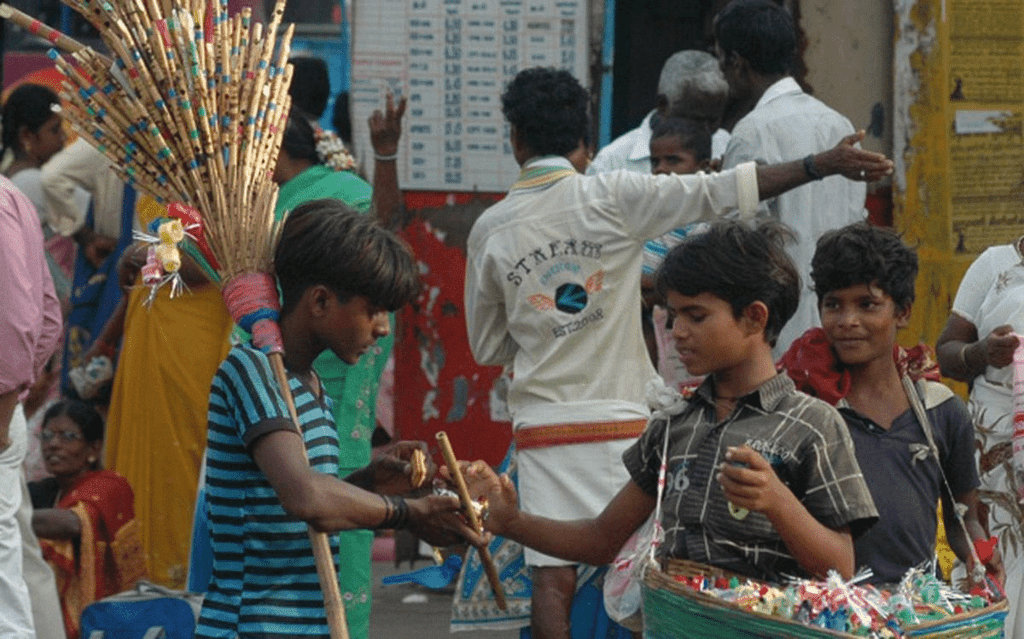
5. What kind of work do they do? Why do they have to work?
Ans. They have to do the following types of work:
(i) Fish catching and cleaning
(ii) Picking up the luggage of people at the bus or railway station
(iii) Kabariwala (picking up rags from the houses or big dustbins)
(iv) Working as a servant in the house or shop.
They have to work because of poverty. They belong to those families who are as poor that they don’t have money even to eat basic food. Thus, their children are forced to work.
Tell
1. In Khedi village what did children learn?
Ans. Children in Khedi village learned the following:
(i) Dancing
(ii) Playing flute and dhol
(iii) Making vessels and other things from bamboo and clay.
(iv) Recognising birds and imitating their sounds etc.
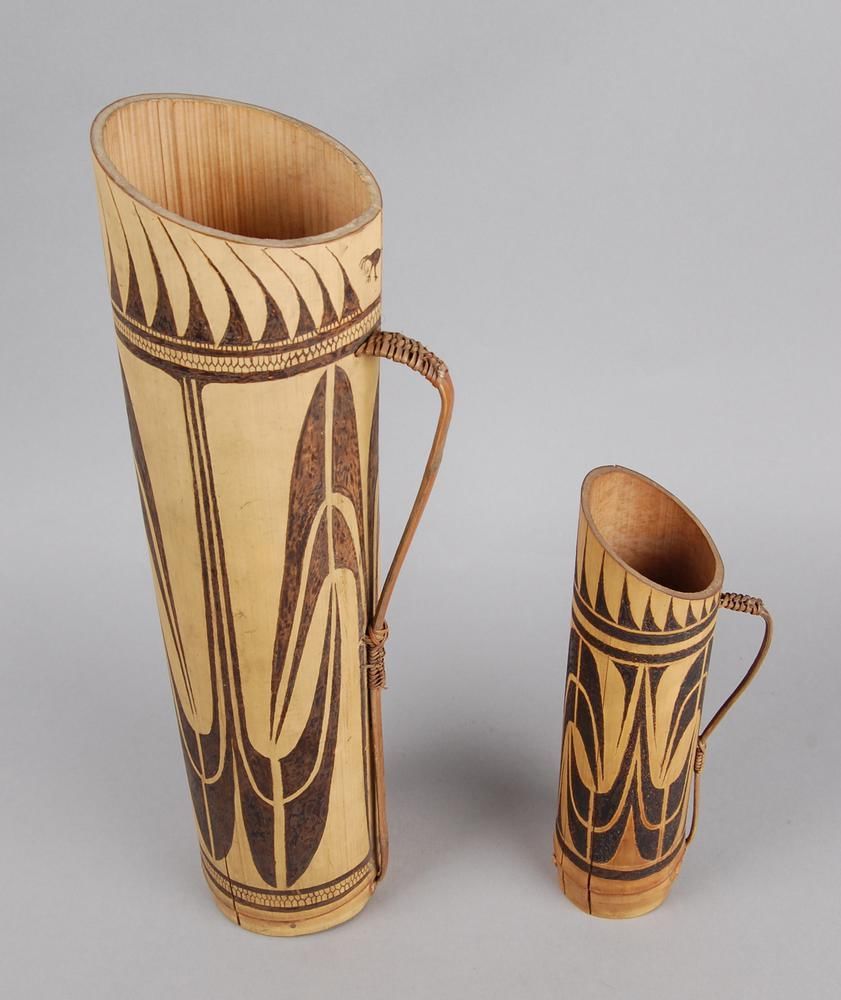 Vessels made from bamboo
Vessels made from bamboo
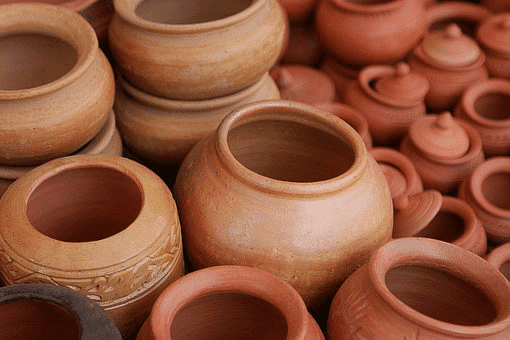 Vessels made from clay
Vessels made from clay
2. What do you learn from your elders?
Ans. I learn the following from my elders-
(i) To respect elders.
(ii) To sleep, wake up, study, and play on time and in a proper routine.
(iii) To maintain love and affection with friends and brothers and sisters.
(iv) To help in some household jobs.
3. Jatrya learned so many things in Khedi. How many of those would be useful for him in Mumbai?
Ans. Jatrya had learned many things in Khedi. Out of these, he can use some of them to earn money in Mumbai, such as:
Fish catching, selling goods in the market, playing dhol, etc.
4. Do you hear the sounds of birds every day? Show how.
Ans. Yes, I often hear the sounds of birds such as:
Guttar-Guttar of pigeon
Chi-Chi of sparrow
Kav-Kav of cow
5. What are some of the sounds that you hear every day, that the people of Khedi may not be hearing?
Ans. Some of the sounds that we hear every day but the people of Khedi may not be hearing are:
Horns of the vehicles.
Sound of trains
Sound of loudspeakers.
6. Have you experienced silence? When and where?
Ans. Yes, I experience silence daily at night when I am sleeping. At this time there is no sound at all. The people, animals, and birds are all sleeping. There is no vehicle on the roads as well. Thus, there is complete silence.
Discuss and Tell
1. Many people in Jatrya’s village did not agree to move away from their land and forest. Why? They had to leave even though they did not want to?
Ans. Many people of Jatrya’s village did not want to leave their land and forest because – it was their grandfather’s land and they had many old members associated with that place. But still, they had to leave that place because they were ordered to leave the village by the government officials along with the police. Moreover, they were promised that they will be shifted to a much better where there will be electricity, water, etc.
2. In Khedi how many people were there in Jatrya’s family? Who came to his mind? What he thought about his family?
Ans. There were three people in Jatrya’s family in Khedi. His father, mother, and Jatrya himself. When he thought about his family, he thought of his would be wife and would-be children.
3. Who all came to your mind when you think about your family?
Ans. When I think about my family, my grandparents, parents, and brother come to my mind.
4. Have you heard of people who don’t want to be moved from their old place? Talk about them.
Ans. Yes, my grandparents live in the village. They don’t want to leave their old place. They say it's their grandfather’s land and they have many sweet memories associated with that place, their farms, and their pet animals. Therefore, they do not want to come and live in the city.
5. Do you know some people who have never been to school? Do you also know of any place where there is no school?
Ans. Yes, our maidservant has never been to school. There is a small village in Rajasthan, where there is no school.
Imagine
1. Think of the kind of difficulties people have to face when a dam is being built.
Ans. People have to face many difficulties at the place where a dam is being built, such as:
(i) Their houses, farms, etc. Are all destroyed.
(ii) They are promised to be given some compensation by the government but sometimes, they have to face many difficulties in getting this compensation.
(iii) They are given new houses to live but they are not as good as were told to them. They have electricity but it remains for few hours only. There are taps no water.
(iv) The other people treat the village people as poor, uneducated, and inferior.
Write
1. Was Sinduri village like the Jatrya’s dreams?
Ans. No, Sinduri village is not like the village of Jatriaya’s dreams.
2. What difference does he find between Sinduri and his dream village?
Ans. The difference that he found between Sinduri village and his dream village are as follows:
(i) He thought that his house in the new village would have electricity, water in taps, and all basic things. But it was not so in Sinduri village. There was no electricity but it was just very difficult to pay the heavy bills. There were taps but no water.
(ii) There was no place for keeping the animals.
(iii) They were given land for farming but it was not good for farming, it was filled with stones and pebbles.
(iv) There was a school, but the teacher did not pay attention to the children from Khedi village. These children found it difficult to learn a new language.
(v) There were doctors, but they were not available on time.
(vi) The people of Sinduri village also treated them as unwanted guests and found their language and way of living strange and made fun of them.
3. Have you ever been to anyone’s house as an ‘unwanted guest’? How did you feel?
Ans. When guests come to stay at our home for a few days, then we respect them. We arrange for their meals, bedding, other basic requirements, etc. We prepare their favorite food items. We also take them to some good places to entertain them.
4. What all does your family do when you have guests at home for a few days?
Ans. When guests come to our home for a few days we will treat them in a special way by preparing nice dishes, we provide all facilities which they need for their comfortable stay along with love and care.
Think
1. What had Jatryabhai thought while moving to Mumbai? Did he find Mumbai as he had imagined?
Ans. The problems of Sinduri village made Jatrya think as if he was an unwanted guest in the village. He wanted to leave Sinduri. As he could not go back to Khedi so he thought of moving to Mumbai. He did not find Mumbai as he had imagined, it was difficult to live in Mumbai.
2. What kind of school do you think Jatrya’s children would be going to in Mumbai?
Ans. Jatrya’s children would be studying in a government school in Mumbai.
Find Out and Write
1. Do you know of any family that has come to your town after having moved out of his place? Talk to them and find out.
Ans. Yes, I know a few students in my school who come from a small village in Rajasthan. They were asked to move from that place.
2. From where have they come? Why did they come here?
Ans. They come from a small village in Rajasthan. They were asked to leave that place by government officials because of the construction of a factory at that place.
3. What kind of place did they live in there? How do they find this new place compared to the old one?
Ans. They used to live in a small village that was very beautiful, peaceful, and simple. There were farms, freely available water, animals, and small schools. The environment was also not much polluted. As compared to that old village, this new place, that is the city is very noisy, crowded, and polluted. People have different cultures and ways of talking. They do not get easily mixed up. Everything is very expensive, even if they have to pay for the water. They are finding it very difficult to survive in this new place.
4. Is their language and way of living any different from that of the people here? In what ways?
Ans. Yes, their language and way of living are very different from the people of this place. They used to speak in the Rajasthani language and their ways of talking in Hindi are also very difficult. Their way of living is also very different. They used to prepare food on chulhas. They used to wear simple clothes, men used to wear ‘dhoti-kurta’ and ‘pagri’ on the head and women used to wear ‘Ghaghra-choli’. But here in the city, there is a gas stove for cooking, men wear shirts and paints and women wear suits, sarees, skirts, etc.
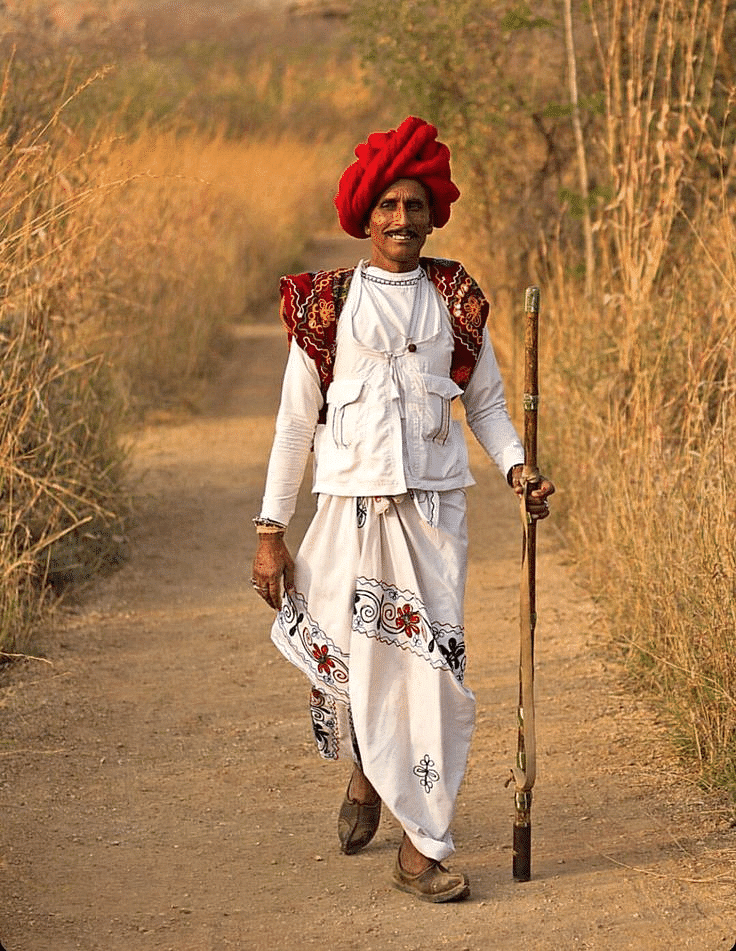 Rajasthani attire-Male
Rajasthani attire-Male
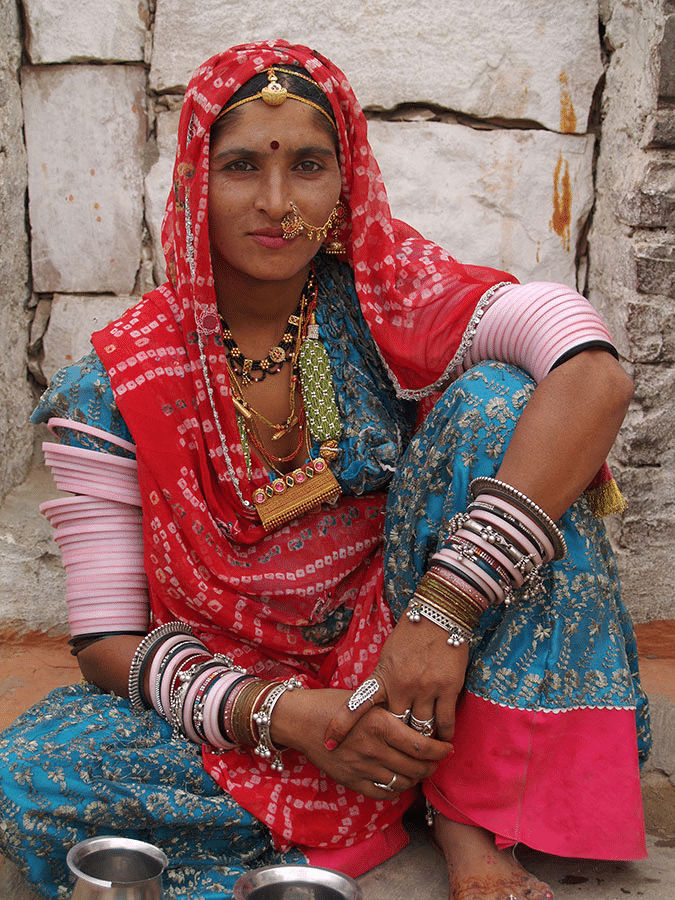 Rajasthani attire-Female
Rajasthani attire-Female
5. Do they know how to make some things that you cannot know? What?
Ans. Yes, they know making special things which I don’t know such as:
Making utensils, pitchers, or other things out of clay.
Bucket out of bamboo.
6. Have you ever read or heard of a city slum being removed? How do you feel about this?
Ans. Yes, I have heard about a slum that was removed from the area near the Yamuna river. The people living there had to face many difficulties as they were ordered to vacate that area immediately. I felt very bad and pity for these people.
7. People also shift from one place to another when they get transferred to their jobs. How do they feel then?
Ans. Many times people have to shift from one place to another when they get transferred to their jobs. In this situation also they feel very bad and have to face many difficulties. They have to leave their houses, schools, friends, and neighbors. In the new place, again they have to search for a new good school and have to adjust to the new people. But in this situation, at least they have a house to live and also since they already have a job, so at least they have enough money to survive.
8. “Some people say that city people do not create garbage. Cities are dirty because of slums”. How do you feel about it? Discuss and debate between yourselves.
Ans. It is incorrect to say that city people do not create garbage. It is because slums this is because in the cities are responsible for shifting the village people to the cities. They construct dams, factories, etc. in the villages and force the villagers to empty those places. The villagers are not provided proper houses in the cities, they are just given small buts with no proper provision for toilets and bathing. As a consequence, these poor people are forced to use the roads and drains for this purpose. This causes dirty and foul-smelling areas. So, actually, the difficult situations in which they are forced to live are responsible for this. On the other hand, the city people cause a lot of pollution due to the vehicles, factories, etc. Thus, the given statement is incorrect.
What we have Learnt
31. Like Jatrya’s family thousands of families come to stay in big cities for many different reasons. Do you think their life may be better in a big city than what it was before? Imagine how they feel in a big city.
Ans. When families like Jatrya’s come to stay in big cities, their life becomes very different from what it was before. They have to face many problems in these big cities such as-
(i) They are not provided proper houses in the big cities, they are just given small hunts to stay with no proper facility for bathing and toilet.
(ii) They have the provision of electricity but it remains for only some time. Also, they have to pay the electricity bills, which they cannot afford.
(iii) There are taps but with no waste. They have to pay for the water also.
(iv) They are not well qualified, therefore it is very difficult for them to get good jobs. Even their children also have to work.
(v) There are schools for the children, but it is very difficult for them to understand the new language. Also, the teacher does not pay much attention to them.
|
53 videos|388 docs|51 tests
|
FAQs on NCERT Solutions for Class 5 EVS Chapter 18 - No Place for Us
| 1. What is the article "No Place for Us" about? |  |
| 2. How does the article highlight the issue of refugees not having a place to call their own? |  |
| 3. What are some of the reasons for the lack of integration of refugees mentioned in the article? |  |
| 4. How can the issue of refugees not having a place be addressed? |  |
| 5. What are some potential consequences of not addressing the issue of refugees not having a place? |  |





















